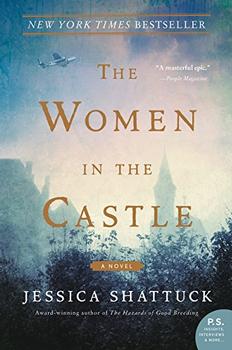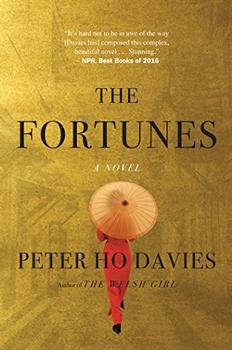Summary | Excerpt | Reading Guide | Reviews | Beyond the book | Read-Alikes | Genres & Themes | Author Bio

Rebellion overlays the stories of four women, spanning a century and the globe in their wide distance from one another. Patterson effectively sketches in the ties that bond them together, and does so patiently and gradually. In one way or another, each character is isolated, foreign, or blocked from the connection and passion she desperately needs. As the novel develops, we watch each of them choose their rebellions, large and small.
Sisters Louisa and Addie, originally from Ohio, are young and newly married in the late 1800s. When Louisa and her new husband move to a farm in Illinois, she cries at the sight of the rough cabin that will be her home. When Addie moves to China with her husband to be a Protestant missionary, it takes years before she acclimates to the dust. The sisters' narratives begin as they correspond through letters that take months to cross the ocean. Then Addie's letters mysteriously stop. The news that follows slowly makes its way from China to rural Illinois, describing brutal attacks on Christians. These incidents are part of the Boxer Rebellion (see Beyond the Book), and Louisa fears the worst for her sister.
The other two main characters are Hazel and Juanlan; their stories take place in more contemporary times. Hazel is Louisa's daughter, and we are introduced to her in 1999 when, as an elderly woman, she is being moved off the same farm that her mother moved into a century earlier. Hazel's narrative then jumps back to when her own children are young. Her husband suddenly dies and she is left to do all she can to hold on to the farm.
The fourth character, Juanlan, is Chinese. A new college graduate in the late 1990s, she is moving back to her home village because her father is ill and she has been unable to secure a professional position in the city with her English degree. While there are familial connections between the two sisters and between Louisa and Hazel, Juanlan seems untethered to the other narratives. We first learn this of Juanlan: "She has a live wire inside her, a little burning blue coil." She feels unsatisfied in many ways, most of them stemming from the roles she reluctantly takes on as translator to a visiting American and as English tutor to the son of a prominent businessman in the village.
It is ultimately Addie's story that propels the novel and builds the connective tissue between the characters. While there are certain things we know through the letters from Addie, her sister Louisa's perspective is clouded by her own desire to be a mother and the repeated miscarriages and deaths of young children she endures. When Louisa finally has a chance to learn what happened to Addie, she chooses not to. But, despite Louisa's unwillingness to face Addie's fate, words from the past manage to reach the more contemporary characters, Hazel and Juanlan.
Though the Boxer Rebellion is the presumed cause of Addie's disappearance, the historic event stays mostly in the background. The meat of the novel comprises the four stories and each character's means of rebelling against the bounds of her circumstance. These personal rebellions aren't easy to define. They are messy. Each character changes her situation, but there is always a price on the other end.
Louisa is a foreigner to farming and all the physical labor it entails. She feels herself drifting away from her sister, unable to fathom what Addie describes of her life in China. Hazel finds herself lost when her husband dies. When the refrain from family and friends is that she can't make it on her own, she only grows more determined.
As a foreign missionary in China, Addie thinks of herself as a circus performer. Her inability to communicate makes her feel as though "she had been locked alone in a cage and only just noticed." Ultimately, her desire to have a meaningful personal relationship fuels her rebellious choice. Juanlan doesn't fit in either, though she is living in her home village. On the one hand, she acts as an advocate and interpreter for foreigners, on the other, she can't reconcile that role with what she sees as real risks to her home – her father's failing health and the likelihood that the family business won't succeed. Knowing spoken English makes her valuable, but only to a point. Her rebellion is perhaps the most literal, her actions raw and seemingly instinctual.
In the end, I was left with the feeling that I hadn't quite connected all the dots. How do Hazel and Juanlan read past events, do they consider their relevance to their own lives? Maybe it's okay that these questions remain unanswered. After all, each character proves to be highly skilled at keeping that which is most private all to herself.
![]() This review was originally published in The BookBrowse Review in September 2017, and has been updated for the
August 2018 edition.
Click here to go to this issue.
This review was originally published in The BookBrowse Review in September 2017, and has been updated for the
August 2018 edition.
Click here to go to this issue.

If you liked Rebellion, try these:

by Jessica Shattuck
Published 2018
Three women, haunted by the past and the secrets they hold.

by Peter Ho Davies
Published 2017
From the author of The Welsh Girl comes a groundbreaking, provocative new novel.
Your guide toexceptional books
BookBrowse seeks out and recommends the best in contemporary fiction and nonfiction—books that not only engage and entertain but also deepen our understanding of ourselves and the world around us.